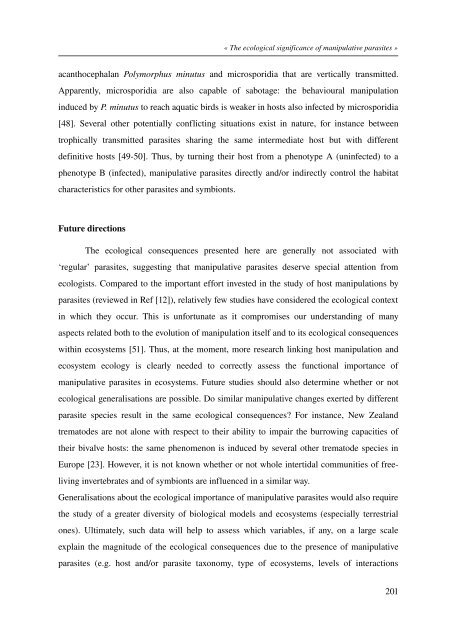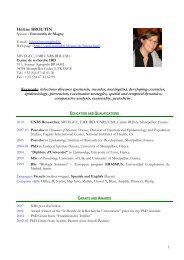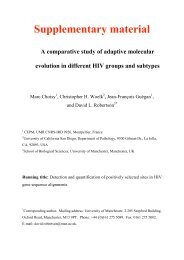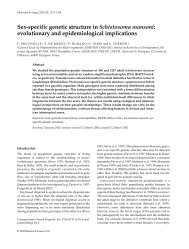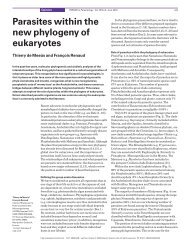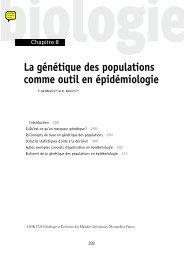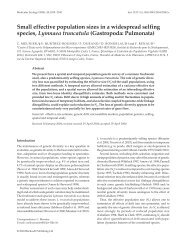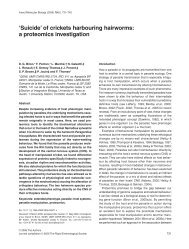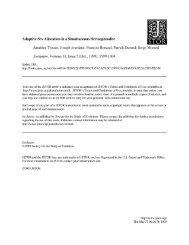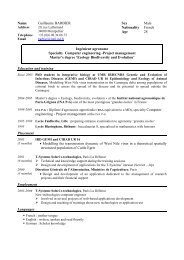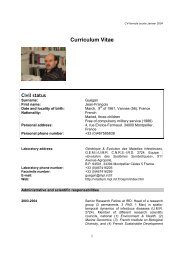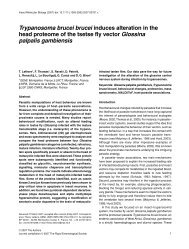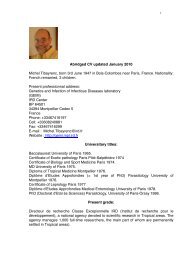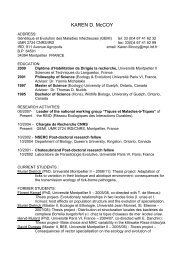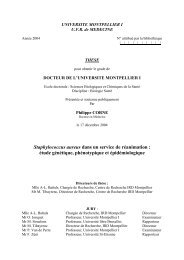écologie des virus influenza aviaires en Camargue - IRD
écologie des virus influenza aviaires en Camargue - IRD
écologie des virus influenza aviaires en Camargue - IRD
You also want an ePaper? Increase the reach of your titles
YUMPU automatically turns print PDFs into web optimized ePapers that Google loves.
« The ecological significance of manipulative parasites »acanthocephalan Polymorphus minutus and microsporidia that are vertically transmitted.Appar<strong>en</strong>tly, microsporidia are also capable of sabotage: the behavioural manipulationinduced by P. minutus to reach aquatic birds is weaker in hosts also infected by microsporidia[48]. Several other pot<strong>en</strong>tially conflicting situations exist in nature, for instance betwe<strong>en</strong>trophically transmitted parasites sharing the same intermediate host but with differ<strong>en</strong>tdefinitive hosts [4950]. Thus, by turning their host from a ph<strong>en</strong>otype A (uninfected) to aph<strong>en</strong>otype B (infected), manipulative parasites directly and/or indirectly control the habitatcharacteristics for other parasites and symbionts.Future directionsThe ecological consequ<strong>en</strong>ces pres<strong>en</strong>ted here are g<strong>en</strong>erally not associated with‘regular’ parasites, suggesting that manipulative parasites <strong>des</strong>erve special att<strong>en</strong>tion fromecologists. Compared to the important effort invested in the study of host manipulations byparasites (reviewed in Ref [12]), relatively few studies have considered the ecological contextin which they occur. This is unfortunate as it compromises our understanding of manyaspects related both to the evolution of manipulation itself and to its ecological consequ<strong>en</strong>ceswithin ecosystems [51]. Thus, at the mom<strong>en</strong>t, more research linking host manipulation andecosystem ecology is clearly needed to correctly assess the functional importance ofmanipulative parasites in ecosystems. Future studies should also determine whether or notecological g<strong>en</strong>eralisations are possible. Do similar manipulative changes exerted by differ<strong>en</strong>tparasite species result in the same ecological consequ<strong>en</strong>ces? For instance, New Zealandtremato<strong>des</strong> are not alone with respect to their ability to impair the burrowing capacities oftheir bivalve hosts: the same ph<strong>en</strong>om<strong>en</strong>on is induced by several other trematode species inEurope [23]. However, it is not known whether or not whole intertidal communities of freelivinginvertebrates and of symbionts are influ<strong>en</strong>ced in a similar way.G<strong>en</strong>eralisations about the ecological importance of manipulative parasites would also requirethe study of a greater diversity of biological models and ecosystems (especially terrestrialones). Ultimately, such data will help to assess which variables, if any, on a large scaleexplain the magnitude of the ecological consequ<strong>en</strong>ces due to the pres<strong>en</strong>ce of manipulativeparasites (e.g. host and/or parasite taxonomy, type of ecosystems, levels of interactions201


